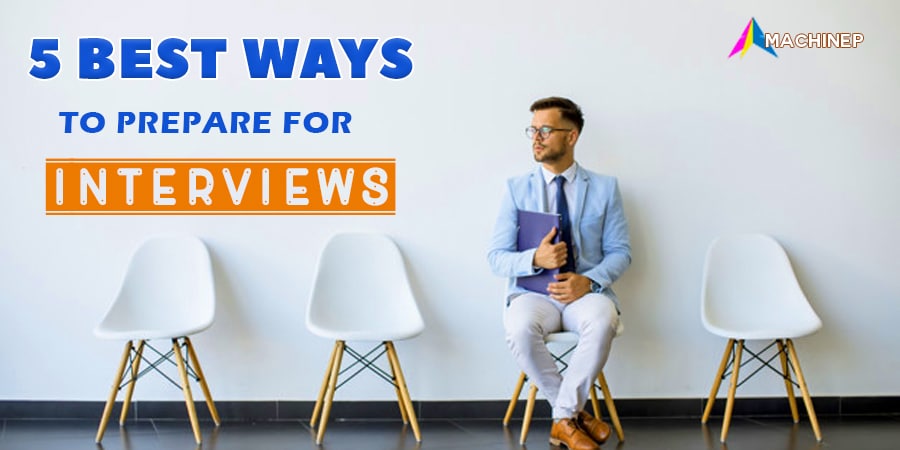Job interviews are frequently a requirement for employment in reputable companies. The interview can be performed in person or by live video on the internet. However, regardless of the interview format, the most important element to consider is how you will pass your interviews and be chosen over other individuals who applied for the same position. The good news is that this article will effectively equip you with the 5 Best Ways to Prepare for Interviews by exposing you to all of the key components you must master to fit the mold.
One quick fact to remember is that a good INTERVIEW PREPARATION + JOB OPPORTUNITY = SUCCESS. Indeed, it is preferable not to have a job, scholarship, or internship interview than to have one and not be prepared. Furthermore, many statistics reports have shown that persons who fail and lose employment interviews are far more numerous than those who fail various examinations.
As a result, many people have attended interviews, but their chances of getting employed have always been shattered during interviews. This is determined by their level of interview preparation and performance. Let’s go through all you need to know about interview preparation.
6 Benefits Of A Good Preparation For Interviews
- It boosts your self-confidence before the interviewer
- It takes away any tendency of stage fright
- It equips you with valuable information for the interview
- It increases your chance of getting the job at ease
- It greatly helps your health, psychologically, emotionally, and otherwise
- Proper preparation prevents poor performance in interviews
5 Best Ways To Prepare For Interviews in 2021
- Do detailed research about the Company, School, etc.
- Prepare a fantastic CV/Resume about yourself
- Practice and memorize answers to questions
- Prepare intelligent questions to ask the interviewers
- Figure out the best attire to put on
1. Do detailed research about the Company, School, etc.
If you want to pass your interview, it’s essential to do detailed research about the company, school, enterprise, etc., you want to work for. This research will enlighten you about the company and the way it operates. However, the interviewers are fond of asking questions about the company to know if you’re grounded with the necessary things about the company. So, you could wonder, how am I doing corporate research? As you can see here, the solution is rather easy.
How to make a detailed research about a Company
- Go to Google or any search engine to browse about the company
- Go to their website, and tour around
- Study the history and formation of the company
- Study the challenges and successes of the company
- Research on the type of services the company offers
- Check out the company’s branches and sub-branches
- Discover the different departments of the company
- Get down the type of employees they look up to
- Study the potential Interviewers (if possible)
- Discover the company’s payment range for the job you’re going for
- And lot more
However, there will probably encounter questions from your interviewers concerning these different points about the company. And here, the interviewers aim to find out how much you know about the company you want to work with. A fantastic response to questions emanating from these will take you a step above getting the job.
Bottom Line
A thorough investigation of the firm or organization for which you wish to work will undoubtedly offer you an advantage. So, in order to have a successful interview and a good chance of acquiring the job, it’s necessary to gather as much information as possible about the organization, departments, pay range, services, and so on.
2. Prepare a fantastic CV/Resume about yourself
Your CV/Resume is your highest instrument to get a good job in any reputable company. This is because it contains all the information about you, background, work experience, qualifications, skills, and a lot more. In fact, the information you give out on the interview day must correspond with the content of your CV/Resume. So, preparing a fantastic CV/Resume about yourself is of utmost necessity.
However, in as much as you would like to write mind-blowing things about yourself in the CV/Resume, it’s not a habit to include things that are not true or verifiable about you. For example, picture the skills category of the CV/Resume. You would probably be tempted to incorporate some skills you do not know to increase your chance of getting the job. So, stay away from anything that would implicate you by being meticulous when writing your CV/Resume.
Luckily for you, preparing a professional CV is now a piece of cake. You can use any online CV/Resume Builder to create one for yourself. However, among the numerous online CV Builders, some stand out to be the best.
» MORE: Best Online CV Builder
The most important thing about writing your CV/Resume is this: There’s always a need to edit your CV/Resume according to the company you’re going for. This entails that if you’ve got a CV/Resume already, you need to study the company you want to apply to and edit your CV to best suit the company’s expectations.
In practice, if you had a CV/Resume you prepared for a marketing job in a company, you probably focused on displaying your marketing skills and strategies, your work experiences for the related position, completed projects, and more. But, if you want to go for a programming job this time, you need to edit your CV to expose more of your Programming skills, versatilities, experiences, completed projects, and more.
» MORE: How To Increase Your Business/Income
Bottom Line
Your CV/Resume speaks a lot about you, and it’s a compulsory document for any interview. So, if you want your interview to be successful in securing a job, write a very persuasive CV/Resume with the major information in accordance with the job you’re going for. It’s also important to prepare yourself to defend the content of the CV/Resume; this shows the validity and originality of the CV/Resume.
» MORE: 8 Best Ways To Build Your Self Confidence
3. Practice and memorize answers to questions
As a candidate going for an interview, there are possible questions that you would expect your interviewers to ask you. These questions can follow from a good introduction about yourself to the details about your CV/Resume content. Also, you can get a hint of any other questions from the researches you have made about the company.
Remember, you should not cram your responses. It’s always better to memorize them and have them on the tips of your fingers. The reason why you should not cram is you’re not sure about the flow of questions from the interviewers; you would probably mess up the whole thing if they don’t come the way you crammed them. Not just that, if you memorize the answers, you’ll be 65% more confident than when you cram them. And, when you cram, you would find yourself restless as you would like to recite the answers to yourself over and over again to retain them up there. But memorization comes with relaxation, which boosts your Intelligence Quotient (IQ), which is very important.
5 Common Questions Interviewers Always Ask and Answers
- Can we meet you? or Tell us about yourself
- What attracted you to our company?
- What are your strengths?
- What are your weaknesses?
- Why did you leave your former job?
1. Can we meet you? Tell us about yourself
In practice, one of the interviewers may ask, “Can we meet you?” Here, they are simply asking you to introduce yourself in a few minutes. To answer this properly, you should be concise yet incorporate relevant information about yourself. Your answer can be in this form: My name is Smart. I’m a twenty-three-year-old Philosophy graduate from New York with versatile programming skills, blogging, graphic designing, SEO, writing, proofreading, and then some. I’m a keen fan of sports, and I play some musical instruments at my leisure. Recall that, ‘can we meet you?’, is another way of asking ‘tell us about yourself.
2. What attracted you to our company?
Here, the interviewer wants to know why you choose to apply to work for the company. It’s a time to discover your interest and the positive things you can contribute to the company. In answering this, you can pinpoint the services of company renders and how it interests you to take the company to a higher level through your professional skills and experience in that field.
3. What are your strengths?
Please, this doesn’t mean your physical strength. It simply means the positive sides of you and how you work with them. When answering the question, it’s a good habit to expose your positive sides while relating them to how you can help the company with them. Your strengths should correspond with your skills and abilities and how you can use them to boost the company’s affairs and services.
4. What are your weaknesses?
Here, the interviewer wants to know the places you need to work on. Of course, everybody has weaknesses, but there are some weaknesses you should not expose during an interview. In fact, when answering this, you should expose only a few temporary weaknesses and, most importantly, how you’re already working towards perfecting yourself in that angle. For instance, you can say it in this manner: Even though I’m a fast typist, I’m not a professional typist. This means that I cannot yet type very fast without looking at the keyboard, but I’m already doing my practice every day to perfect that.
5. Why did you leave your former job?
Here, the interviewer intends to know your reasons for leaving your former job. At this point, you shouldn’t say any negative things about your decision to leave your former job. Rather, you should start by praising your former company and job and then say something positive about your leaving. For example, you can respond in this manner: My former job was superb, and my positive impacts on the company while working with my colleagues are simply phenomenal. But, it’s my interest to work with another team from a different reputable company with different services to give in my professional inputs and be more exposed and versatile.
Bottom Line
The concept of an interview is simply questioning and answering. However, some questions are fundamental and thus being asked in every interview room. So, if you want to have a successful interview, it’s important to memorize smart answers to the interviewers’ possible questions. Call to mind that you should not cram but memorize.
4. Prepare intelligent questions to ask the interviewers
In most interviews, the interviewee is given a few minutes to ask some questions. Here you’re expected to ask brilliant questions about the company or the interview without mincing words. The interview often determines the questions here. This is important because it shows the interviewers that you care to know more about the company, to know how best to get along.
However, apart from this time, an interviewee can always ask questions during the interview, provided the questions are not off point. Picture this, in the interview room, up to 5 interviewers may ask you different questions simultaneously. It’s always a good habit to answer the ones you grabbed and politely ask for the ones you didn’t get correctly. Again, when you enter the interview room, the interviewers may not offer you a seat in the form of a test. But, after a few minutes, you can request to have a seat (Please, may I sit?).
» MORE: 15 Remote Skills to Acquire Easily with Heavy Income
Bottom Line
Asking relevant and intelligent questions to the interviewers shows that you’re ready to learn more about the company. It’s a good time also to be cleared on some things about the company. So, it’s important to prepare some reasonable questions to ask during the question time of the interview.
5. Figure out the best attire to put on
It’s often said that ‘you’re addressed the way you’re dressed.’ This entails that your dressing at any time says a lot about you. And so, every interviewee is expected to put on a type of attire to the interview room. However, the attire to put on could vary from one job to another. But, the most important thing is to dress not to attract unnecessary distractions with your dressing code. You may consider these tips on how to dress for an interview.
» MORE: How To Start-up Your Own Business From Scratch And Succeed
6 Tips on how to dress for an interview
- Dress simply but smartly
- Do not wear heavy makeup
- Do not wear offensive perfumes
- Do not wear any weird colors clothes
- Do not leave your hair unkept
- Wear simple watches, necklaces, earrings, or other jewelry
Bottom Line
Your dressing to the interview room says a lot about you. In fact, some interviews have a higher grade for dressing codes. So, if you’re preparing for an interview, it’s crucial to figure out the best attire to suit the interview and wear it on D-Day.
At this moment, you’re already confident on how to prepare for an interview following the points and deep explanation about the 5 Best Ways to Prepare for an interview. But that’s not all. Let’s explore the Dos and Don’ts of Preparing for interviews below.
» MORE: 7 Easy Steps To Start A Business With Little Or No Money
6 Things You Should Do in an Interview
Some points are repeated below for the sake of emphasis. But, first, take a look at the 5 things you should do in an interview.
1. Make a good first impression
If you’re going to a face-to-face interview, plan your trip there, do a trial run if it is at an unfamiliar location and arrive a few minutes early for the interview. Late arrival for a job interview is inexcusable. So, take your CV and ensure you know the dates and specifics to talk through your CV and give examples confidently. For a video interview, minimize technical issues by testing your video tool the day before your interview. And, on the day of your interview, ensure you are set up and ready to go at least 15 minutes before your scheduled time, in a quiet and comfortable place.
2. Do your homework
Preparation is an essential step in the interview process, so don’t let yourself down before it’s even taken place. Researching the company you are meeting with will show your interest in the business and give you an upper hand. Look at their website and what’s happening in the news to widen your research and see what the media is saying about the company. Please don’t limit your research to this alone; ensure to research the background of your interviewers, including their career history and specific achievements.
3. Listen and respond accordingly
Too often, the feedback from clients is that the candidate does not answer the question clearly and directly. So don’t run circles around the questions. Instead, listen and answer accordingly while using examples from your experience to back it up.
4. Prepare smart, open-ended questions to ask the interviewer
Remember that an interview, as well as get you noticed and separate you from other candidates. It will also determine if this really is the opportunity or business you want to join. Communicating your experience and successes clearly will highlight any of your strengths that are relevant to the role.
5. Sell your strengths and expertise
Ensure that you communicate your strengths to the interviewer in a concise, factual, and sincere manner.
6. Memorize some things you see in the interview room
One of the interviewers may ask you to close your eyes and tell them the things/objects you saw in the office.
6 Things You Should Not Do In An Interview
1. Don’t speak poorly about your present or former employers:
The interviewer will assume you will do this to them if you leave and question your professionalism. This is a big red flag to anyone interviewing a candidate.
2. Don’t falsify information
Answer questions truthfully and as close to the point as possible. Explain and describe things about yourself that relate to the position on offer and truly reflect your experience. If you are being probed in an area that is not a strength, be honest and let your interviewer know you are willing to learn or work on and how you can upskill in this area. Follow that with strengths you have in another area that you could bring to the table.
3. Don’t speak over the interviewer
It is important to be a good listener as well as a good talker. It shows that you are respectful and have strong interpersonal skills. If you are interviewing via a video platform, remember that there will be a slight time delay. Avoid rushing to answer a question if your interviewer hasn’t finished speaking.
4. Don’t assume it isn’t an interview
Regardless of what interview stage you are at or who you are meeting – it may be over a coffee, a few drinks, or just labelled a final chat – it is still used as an opportunity to assess your suitability for the potential role.
5. Don’t let any past rejections infringe on future ones
Finding a new job can be taxing. So, you should ensure to approach every interview as a new opportunity and learn from past interview mistakes. If you have several interviews lined up, try to leave some space between them to ensure you are at your best.
6. Greeting the Interviewers
You can greet the interviewers upon your entrance but do not move forward to shake or hug them without an offer from them. And, even though they request for a handshake, do not be the first to remove your hand or try to make a clap with the handshake. As a lady, always slant your hand as you approach to respond to the handshake offer.
Now, go out there and do your best.










![Extraordinary Pastor Lands from the Sky During Service [Video]](https://machinep.com/wp-content/themes/Extra/images/post-format-thumb-text.svg)
I think this is among the most important information for me. And i am glad reading your article. But want to remark on few general things, The website style is perfect, the articles is really nice : D. Good job, cheers
Oh my goodness! a tremendous article dude.
Highly informative
Thanks for the auspicious writeup.
Someone essentially help to make seriously posts I would state. This is the very first time I frequented your web page and thus far? I amazed with the research you made to make this particular publish extraordinary. Hoping to get the job.
Hi Daig, I’m glad you found it helpful. Best of luck!
Great work!
Thanks for the help
It would be nice to know more about that. Your articles have always been helpful to me. Thank you!
Thanks for posting. I really enjoyed reading it, especially because it addressed my problem. It helped me a lot and I hope it will help others too.
Nice read, I just passed this onto a friend who was doing some research on that. And he actually bought me lunch as I found it for him smile So let me rephrase that: Thanks for lunch!
Hi Marrybelle, hope you enjoyed the lunch? 🙂
Your comment just made our day.
I am typically running a blog and I actually respect your content. The article has really peaks my interest. And I’ve sent you a mail at machinep10@gmail.com. Please, check it out and give me a response. All information is in the email.
Hi Corra, I’m glad you find the article helpful. I’ve responded to your mail and it’s in your favor. Thanks for your interest.
Thanks for these ideas… I’m definitely going to apply them for my forthcoming interview.
Hi Berlin, thanks for the comment. And, good luck as you go for the interview 🙂
Hi, you’ve got some good points here.
Hi Lucy, thanks for reading and commenting.
Regardless, this is one of the best I’ve come across recently. Every point is valuable and helpful.
Regards to the writer
Hi Katerina, thanks for this amazing comment. I’m glad this helps you.
I think the two (2) things that made real sense and differentiate this article from others out there is;
1.) Giving false information:
I think a lot of people are fond of this habit.
2) Cramming your response:
People do this often when preparing for an interview because they’re afraid of screwing things up, preparing doesn’t mean you should cram.
Hey bro, keep it up.
Hi Elvis Digital, thanks for the wonderful comment and contribution 🙂 I’m glad you read through..